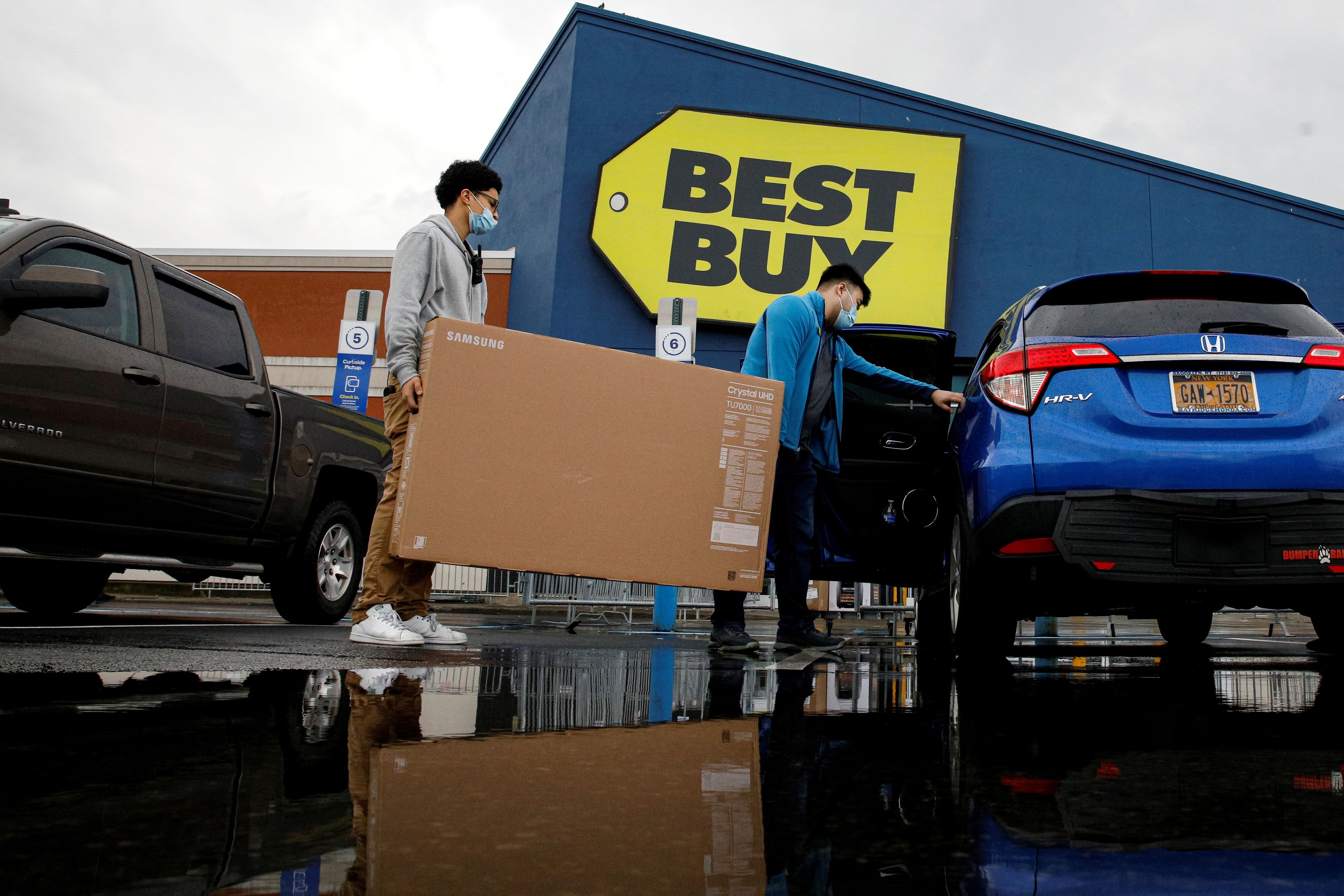Best Buy shares pop as investors bet pandemic gains will outlast fourth-quarter supply chain, staffing hiccups

Best Buy on Thursday reported fourth-quarter results that fell short of expectations, as it was hamstrung by supply chain challenges and omicron-related staffing shortages. But the company’s shares rose, as executives painted a rosier picture of the years ahead and investors bet that sales gains made during the pandemic will outlast near-term hiccups.
Shares rose as much as 9% in premarket trading, despite weaker-than-expected short-term outlook. Best Buy is lapping challenging year-over-year comparisons when the pandemic and stimulus checks fueled sales.
CEO Corie Barry said in an earnings presentation that the retailer had low inventory on some popular holiday items and reduced store hours in the fourth quarter. Yet she said the retailer hit its fastest ever holiday delivery times and zeroed in on key growth areas like its membership program, Totaltech, and health business.
She said company leaders are “deliberately investing in our future and furthering our competitive differentiation,” even if that weighs on short-term profits.
And, she added, the pandemic has turned telemedicine, online fitness and video conferencing into permanent parts of consumers’ lives — laying the groundwork for a bright future.
“We do not for one minute believe we hit our peak revenue and margin this past year,” she said.
Here’s how the company did for its fiscal fourth quarter of 2022, ended Jan. 29, compared with what Wall Street was expecting, based on a survey of analysts by Refinitiv:
- Earnings per share: $2.73 adjusted vs. $2.73 expected
- Revenue: $16.37 billion vs. $16.6 billion expected
Best Buy’s net income dropped to $626 million, or $2.62 per share, from $816 million, or $3.10 per share, a year earlier.
Excluding items, it earned $2.73 per share, matching the $2.73 expected by analysts surveyed by Refinitiv.
Net sales decreased to $16.37 billion from $16.94 billion a year earlier, missing estimates of $16.6 billion.
Same-store sales fell 2.3% during the quarter, underperforming expectations by both the company and analysts. Analysts anticipated that same-store sales would decrease 0.9%, and the company predicted they would come in at a range of a 2% decline to 1% growth.
Best Buy saw its sales and stock price surge during the pandemic as it catered to Americans’ needs, such as extra computer monitors and printers for working at home, cooking appliances for more dining-in and home theater systems and gaming consoles to pass the time. Now, some investors have bet on the retailer’s sales moderating or dropping off as people return to the office and opt for in-person gatherings instead of sitting behind screens.
Shares of the company closed Wednesday at $100.84, up 3.77%. Its market value stands around $24 billion.
Best Buy has managed through headwinds in recent quarters, including chip shortages, spikes in commodity costs and delays on goods shipped from other parts of the globe.
In the year ahead, Best Buy said it expects revenue of between $49.3 billion and $50.8 billion, below the $51.05 billion expected by analysts, according to Refinitiv. It predicts adjusted earnings per share will be between $8.85 and $9.15 for the full year, lower than analysts expectations of $9.16, according to Refinitiv.
The company said it expects same-store sales to further shrink anywhere from 1% to 4% during the coming year. That’s compared with a 1.4% decline expected by analysts, according to StreetAccount.
In a news release, Chief Financial Officer Matt Bilunas said Best Buy has a lower short-term forecast because it’s following a period of very high demand. However, as it looks to the next several years, he said the company expects to see demand return to levels higher than pre-pandemic sales.
On Thursday, Best Buy’s leaders will detail the company’s strategy to grow beyond the pandemic. It launched an annual membership program, which provides recurring revenue for the company and perks like tech support for customers. It is chasing growth in other categories, too, including connected fitness, smart home and health care.
The company announced a 26% increase in its quarterly dividend on Thursday. It said it will spend about $1.5 billion on share buybacks in the coming year.
Read the company’s earnings release here.
This story is developing. Please check back for updates.




